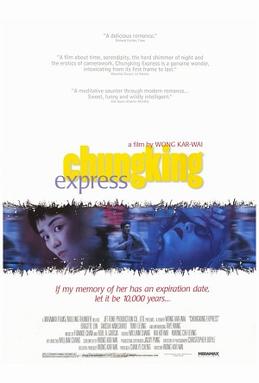
Chungking Express is a 1994 Hong Kong romantic crime comedy-drama film written and directed by Wong Kar-wai. The film consists of two stories told in sequence, each about a lovesick Hong Kong policeman mulling over his relationship with a woman. The first story stars Takeshi Kaneshiro as a cop obsessed by his breakup with a woman named May, and his encounter with a mysterious drug smuggler. The second stars Tony Leung as a police officer roused from his gloom over the loss of his flight attendant girlfriend by the attentions of a quirky snack bar worker.
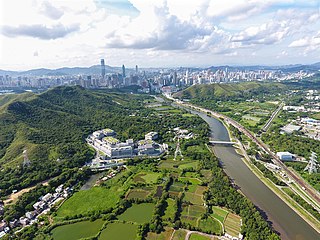
Lo Wu or Lowu is an area in North District, New Territories, Hong Kong. It lies on the border between Hong Kong and mainland China, specifically the Luohu District of Shenzhen in mainland China. The area is most notable as the location of the most heavily used immigration control point for passengers travelling to and from mainland China. It is where the Lo Wu station is located.
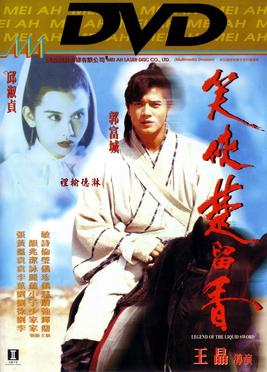
Legend of the Liquid Sword is a 1993 Hong Kong wuxia comedy film loosely based on Gu Long's Chu Liuxiang novel series. The film was written and directed by Wong Jing and stars Aaron Kwok as the titular protagonist. The film is perhaps most famous for inspiring the title of legendary hip-hop album Liquid Swords.

Fist of Fury is a 1972 Hong Kong action martial arts film written and directed by Lo Wei, produced by Raymond Chow, and starring Bruce Lee in his second major role after The Big Boss (1971). Lee, who was also the film's action choreographer, plays Chen Zhen, a student of Huo Yuanjia, who fights to defend the honor of the Chinese in the face of foreign aggression, and to bring to justice those responsible for his master's death.

Jess Row is an American short story writer, novelist, and professor.
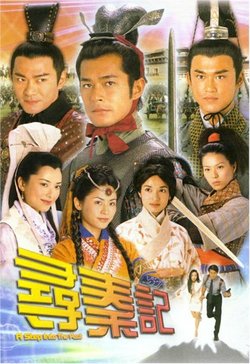
A Step into the Past is a 2001 Hong Kong television series produced by TVB and based on Huang Yi's novel of the same Chinese title. The series tells the story of a 21st-century Hong Kong VIPPU officer who travels back in time to the Warring States period of ancient China. He is involved in a number of important historical events that leads to the first unification of China under the Qin dynasty. The series' first original broadcast ran from 15 October to 7 December 2001 on the TVB Jade network in Hong Kong.
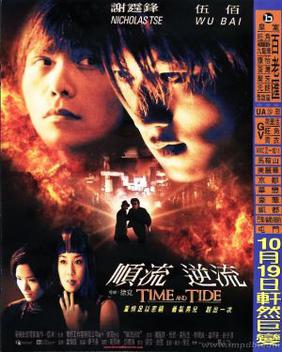
Time and Tide is a 2000 Hong Kong action film directed, produced and co-written by Tsui Hark. The film is set in Hong Kong where a young man becomes a bodyguard and befriends a mercenary determined to begin life anew with the woman he just married. The two men find themselves working together to foil an assassination attempt which propels them toward confrontation with each other.

An Autumn's Tale is a 1987 Hong Kong romantic drama film set in New York City starring Chow Yun-fat, Cherie Chung, and Danny Chan. The film is Mabel Cheung's second directorial effort after her "migration trilogy."

Fatal Contact is a 2006 Hong Kong martial arts film written and directed by Dennis Law, who also producer with Herman Yau. The film stars Wu Jing, Ronald Cheng, Miki Yeung, Theresa Fu, Cheung Siu-fai, Ken Lo, Andy On, Lam Suet and Timmy Hung. Wu Jing played Kong Ko who is trained with the fighting techniques of Sanshou martial arts, and lured into the world of illegal martial arts fighting.
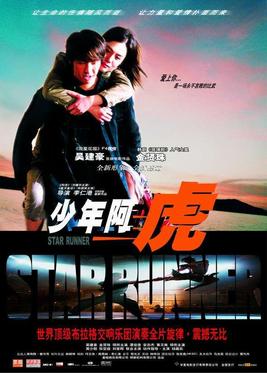
Star Runner, , is a 2003 Hong Kong action/romance film co-written and directed by Daniel Lee. It is rated PG-13 by the MPAA "for intense sequences of martial arts action violence".
Troublesome Night 3 is a 1998 Hong Kong horror comedy film produced by Nam Yin and directed by Herman Yau. It is the third of the 20 films in the Troublesome Night film series.

City Under Siege is a 2010 Hong Kong science fiction action film directed, produced, co-edited and co-written by Benny Chan, which stars Aaron Kwok, Betty Shu, Jacky Wu, Zhang Jingchu, and Collin Chou. The film follows a group of circus performers who goes on a rampage after an accidental exposure to chemical gas left by the Japanese army in World War II, granting them superhuman abilities.

Overheard 2 is a 2011 Hong Kong crime thriller film produced by Derek Yee, written and directed by Alan Mak and Felix Chong and starring Louis Koo, Lau Ching-wan and Daniel Wu. It is a sequel to the 2009 film Overheard where Koo, Lau and Wu play different roles with a different storyline, but the key elements of the first film are kept. Another sequel, Overheard 3 was released on 30 May 2014.

The Grandmaster is a 2013 martial arts drama film based on the life story of the Wing Chun grandmaster Ip Man. The film was directed and written by Wong Kar-wai. It was released on 8 January 2013, in China. It was the opening film at the 63rd Berlin International Film Festival in February 2013. The film was selected as part of the 2013 Hong Kong International Film Festival. The Weinstein Company acquired the international distribution rights for the film. The film was selected as the Hong Kong entry for the Best Foreign Language Film at the 86th Academy Awards, making the January shortlist, but ultimately did not receive the nomination. Despite this, the film was nominated for Best Cinematography and Best Costume Design.

Journey to the West: Conquering the Demons is a 2013 fantasy comedy film co-written and produced by Stephen Chow and co-directed by Chow and Derek Kwok. The movie was first announced in July 2011 and was released on February 10, 2013 in China. The film is a loose comedic re-interpretation of the 16th-century novel Journey to the West, a Chinese literary classic often believed to be written by Wu Cheng'en.

Police Story 2013 is a 2013 Chinese-Hong Kong action crime thriller film directed and written by Ding Sheng, and starring Jackie Chan in another reboot of the Police Story film series. The film is directed by Ding Sheng, who previously helmed Chan's Little Big Soldier. Unlike the previous Police Story films where he portrays a Hong Kong cop, Chan instead portrays a mainland Chinese officer.
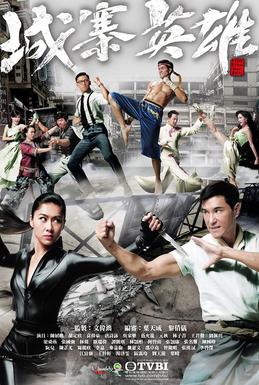
A Fist Within Four Walls is a 2016 Hong Kong martial arts action television drama produced by Jazz Boon and TVB. It premiered on TVB Jade in Hong Kong, Astro On Demand in Malaysia and TVB First in Singapore on 1 August 2016. The final episode aired on 28 August 2016, totalling 28 episodes.

Come with Me is a 2016 Hong Kong comedy web drama produced by Jazz Boon for TVB, starring Eddie Cheung, Sharon Chan, Elena Kong, Louis Yuen, Benz Hui, May Chan, Sammy Sum and Grace Wong as the main cast. It premiered on Hong Kong's TVB web streaming site "myTV SUPER" on June 4, 2016, with five episodes released each Saturday at 12:00 am. The series concluded on June 25, 2016 with a total of 20 episodes. Overseas, the drama aired from May 29 to June 17, 2017 in the 9:30 time slot as a result of TVB Jade airing a remastered version of Phoenix Rising. An 18-episode cut version of the drama would later air in 2017 on TVB Jade.

Marriage Cuisine is a Chinese, Korean, and Hong Kong TV drama that premiered in 2014. It is the first Chinese TV series to co-work with South Korean television. With a high budget of 150 000 000 US$, Marriage Cuisine became the number one TV series of 2014, and broke the Chinese viewer status with 200 000 000 viewers in the mainland in only one week.

Utopians is a 2015 film by the Hong Kong film-maker Scud, the production-crediting name of Danny Cheng Wan-Cheung. It is the story of a university student who becomes deeply attracted to his (male) professor, and whose life changes as a result. The film received its world premiere on 31 October 2015 at the New Directors Film Festival in Japan. Utopians explores several themes traditionally regarded as 'taboo' in Hong Kong society and features full-frontal male nudity in several scenes. It is the sixth of seven publicly released films by Scud. The six other films are: City Without Baseball in 2008, Permanent Residence in 2009, Amphetamine in 2010, Love Actually... Sucks! in 2011, Voyage in 2013 and Thirty Years of Adonis in 2017. The eighth film, Apostles, was made in 2022, as was the ninth, Bodyshop, but neither have yet been released. The tenth and final film, Naked Nations: Hong Kong Tribe, is currently in production. Utopians includes a scene in which the main character, played by mainland China actor Adonis He Fei, is shown completely naked stroking his erect private parts as he sighs with pleasure until he shoots his semen in the uncut version of the film.



















